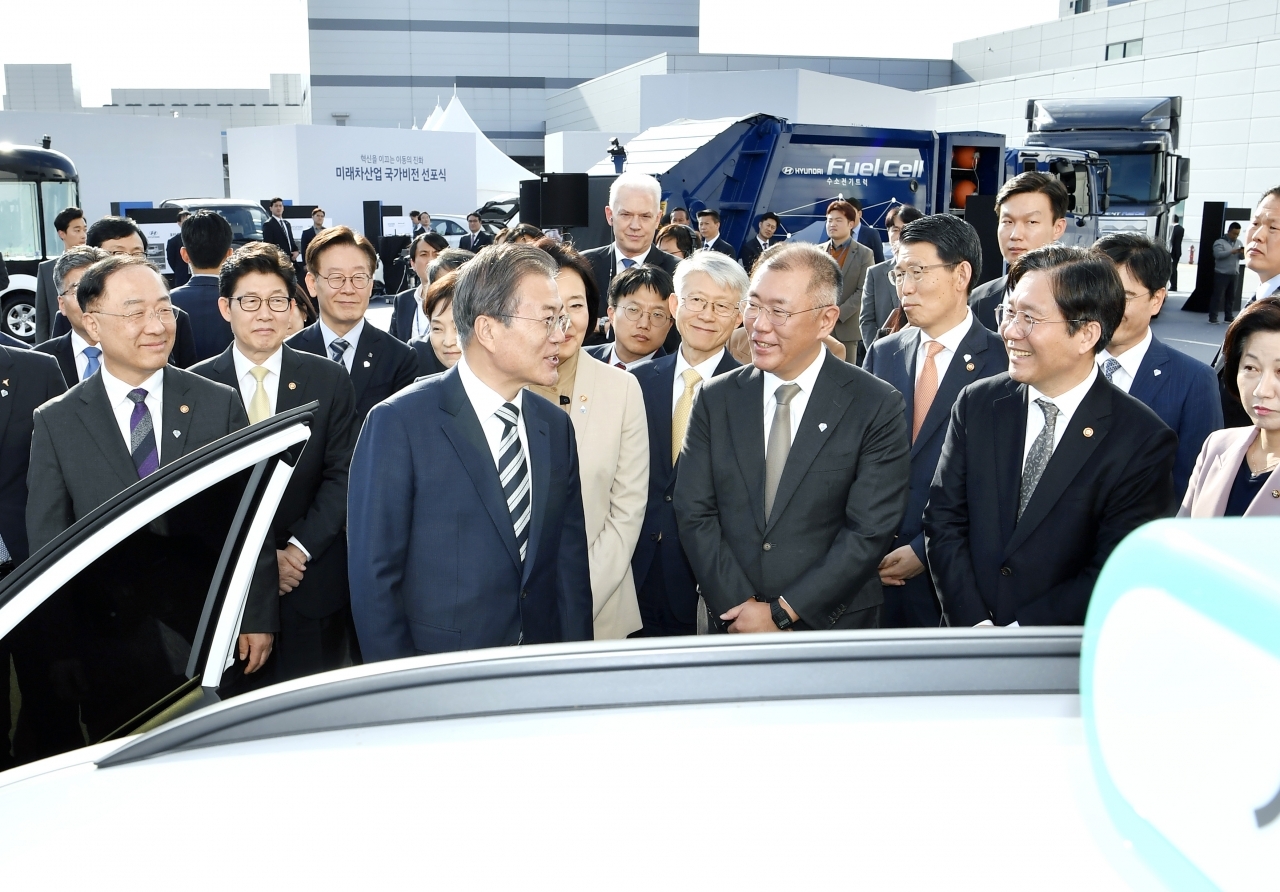현대차, 올해 수소전기차 전용 모델 '넥쏘' 국내 판매 목표 1만100대 목표

정부가 올해 수소차 지원금을 최대 4250만원을 지원하는 등 전기·수소차 등 친환경차 시대를 열기 위한 본격적인 행보에 나선다. 충전소 설립도 40곳을 지원하는 등 그동안 재기됐던 인프라 구축 문제 해결에도 적극 나선다.
기획재정부와 환경부는 올해 무공해차 보조금 산정체계를 전면 개편한다고 20일 밝혔다.
정부는 올해 전기·수소차 구매보조금 지원 대상을 지난해 6만대에서 57% 늘어난 9만4000대로 확대한다는 방침이다. 수소차가 지난해 5504대에서 올해 1만280대로 2배 가까이 늘어난다. 전기차는 지원 대상이 5만4652에서 8만4150대로 늘어난다.
개편안에 따르면 지난해에는 무공해차 배터리 등만으로 보조금을 산정했지만, 올해부터는 전기자동차의 연비, 한번 충전할 때 주행거리 등을 중심으로 보조금 산정체계를 개선해 보조금 차등 폭을 확대한다.
구매보조금은 승용차를 기준으로 국비와 지방비를 포함해 수소차는 최대 4250만원, 전기차 1820만원, 전기이륜차 330만원 등이다. 예를 들어 수소차 넥쏘를 구매할 경우 국비 지원 2250만원에 지자체 보조금 최대 2000만원을 합할 경우 대당 4250만원을 지원받는다.
저소득층에 대한 전기차 보조금도 확대된다. 정부는 차상위 이하 계층이 전기 승용차를 구매하면 900만원 한도에서 국비 지원액의 10%를 추가로 지원한다.
정부는 무공해차 이용자에게 편리한 충전환경을 제공하기 위해 수소충전소 40개소(일반 27개소, 버스 13개소) 설립을 지원하고, 전기차 충전기 9500기(급속 1500기, 완속 8000기)를 지원한다.
민간에서는 현대자동차가 올해 수소전기차 전용 모델 '넥쏘'의 국내 판매 목표를 1만100대로 수립하고 수소전기차 시장을 선도한다는 방침이다.
현대차는 지난 2013년 세계 최초의 수소전기차인 '투싼ix'를 양산, 판매한데 이어 2018년 3월 수소전기차 전용 모델 '넥쏘'를 전격 출시했다. 2018년 727대이던 '넥쏘'의 국내 판매량은 2019년 4,194대로 폭발적으로 증가했다.
현대차가 '투싼ix' 양산 이래 판매한 수소전기차는 '투싼ix'와 '넥쏘'를 합쳐 누적 5,128대(2019년 12월 기준)에 이른다. 올해 1만 대 판매가 현실화될 경우 단일 국가에서 최초로 한해 다섯 자리 수의 수소전기차를 판매하게 된다.
현대차 관계자는 "한국은 세계 최초로 '수소경제육성 및 수소 안전관리법'이 제정되는 등 여러 정책적 지원에 힘입어 수소전기차에 대한 고객의 관심이 크게 늘고 있다"며 "올해는 국내뿐 아니라 북미 시장 수출에 주력할 계획"이라고 말했다.
현대차는 글로벌 수소 생태계 리더십 강화를 위해 수소전기차 및 수소 인프라 확산에 주력하고 있다. 현대차는 지난 2018년 12월 중장기 수소 및 수소전기차 로드맵인 'FCEV 비전 2030'을 공개하고 오는 2030년 국내 연 50만 대 규모의 수소전기차 생산체계를 구축할 계획이다.
정의선 현대자동차그룹 수석부회장은 올해 신년사에서 "세계 최고 수준의 기술을 보유한 수소전기차는 금년부터 차량뿐만 아니라 연료전지시스템 판매를 본격화하고, 관련 인프라 구축사업 협력을 통해 수소 산업 생태계 확장을 주도해 나가겠다"고 강조한바 있다.
[Focus] The hydrogen car era opens in 2020.

The government will launch a full-fledged move to open an era of eco-friendly cars such as electric and hydrogen vehicles, with up to 42.5 million won in subsidies for hydrogen cars this year. The company will also support 40 charging stations, and will actively address the issue of building infrastructure that has been re-established
The Ministry of Strategy and Finance and the Ministry of Environment said Tuesday that they will overhaul the system for calculating subsidies for pollution-free vehicles this year.
The government plans to expand the number of electric and hydrogen car purchase subsidies this year to 94,000 units, up 57 percent from 60,000 last year. The number of hydrogen cars will nearly double from 5,504 last year to 10,280 this year. The number of electric vehicles subject to support will increase to 84,150 from 54,652.
According to the reform plan, the subsidy was calculated last year only with non-polluting car batteries, but from this year, the subsidy calculation system will be improved based on the fuel efficiency of electric vehicles and the mileage of electric vehicles when charging once, thus expanding the gap in subsidies.
The purchase subsidies include up to 42.5 million won for hydrogen cars, 18.2 million won for electric vehicles and 3.3 million won for electric motorcycles, including state and local expenses for passenger cars. For example, if you purchase a hydrogen car Nexo, you will receive 42.5 million won per unit if you add up to 20 million won in subsidies from local governments and 22.5 million won in state funds.
Electric vehicle subsidies to low-income earners will also be expanded. The government will provide an additional 10 percent of state funding from the 9 million won limit if the next-highest or lower class buys electric cars.
The government supports the establishment of 40 hydrogen charging stations (typically 27 stations and 13 buses) in order to provide convenient charging environment for users of pollution-free cars, and 9500 electric car chargers (speed 1,500 and speed 8,000 units).
Hyundai Motor also plans to set a target of 10,100 units for sales of its hydrogen-powered vehicle-only model "Nexso" in South Korea this year and lead the hydrogen-powered vehicle market.
Hyundai Motor mass-produced and sold the world’s first hydrogen-powered vehicle called Tucson ix in 2013, followed by the surprise launch of its hydrogen-powered vehicle-only model "Nexso" in March 2018. Domestic sales of the Nexo, which stood at 727 units in 2018, exploded to 4,194 units in 2019.
Hyundai Motor has sold 5,128 hydrogen-powered vehicles since mass-production of "Tusanix" combined with "Tusanix" and "Nexso" as of December 1919. If 10,000 units are sold this year, it will be the first single country to sell a five-digit number of hydrogen electric vehicles per year.
South Korea is seeing a significant increase in customers' interest in hydrogen electric vehicles thanks to a number of policy support, including the establishment of the "Hydrogen Economic Development and Hydrogen Safety Management Act" for the first time in the world, a Hyundai official said, adding that the company plans to focus on exporting hydrogen electric vehicles to the North American market as well as at home this year.
Hyundai Motor is focusing on expanding hydrogen electric vehicles and hydrogen infrastructure to strengthen its leadership in the global hydrogen ecosystem. Hyundai Motor unveiled its mid- and long-term roadmap for hydrogen and hydrogen electric vehicles called "FCEV Vision 2030" in December 2018 and plans to establish a production system for 500,000 hydrogen electric vehicles in Korea by 2030.
Chung Eui-sun, senior vice president of Hyundai Motor Group, stressed in his New Year's message that the company will start selling fuel cell systems as well as vehicles from this year, and lead the expansion of the hydrogen industry's ecosystem through cooperation in building related infrastructure.


